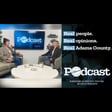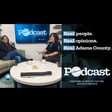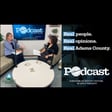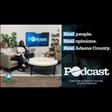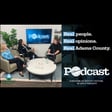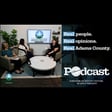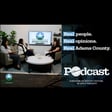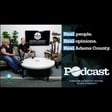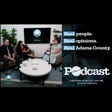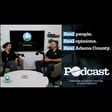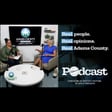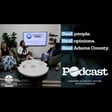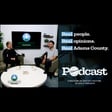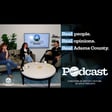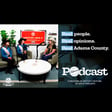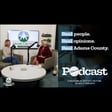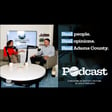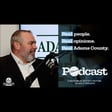Become a Creator today!Start creating today - Share your story with the world!
Start for free
00:00:00
00:00:01

All in Adams--Kinship Care Month
Children are in kinship care when they cannot live with their parents, but live full-time with a relative or any non-relative who has a longstanding relationship with the child or family. This week we talk with administrators from Adams County Kinship Care as well as two County Commissioners who have had personal experiences with Kinship Care.
Transcript
Introduction to All In Adams Podcast
00:00:04
Speaker
Welcome to All In Adams, the official podcast of Adams County Government, where we're all in for our residents, our employees, and our community. So whether you live here, work here, or you just want to know more about what makes Adams County a great place to be, thanks for tuning in.
00:00:21
Speaker
We're all in, Adams. Welcome back to the All in Adams podcast.
Exploring Kinship Care
00:00:25
Speaker
I'm Nikki Wellander, and I'm the press secretary here at Adams County. Today's episode is all about kinship care, which is the incredible way that relatives, close family friends, and more step up for children to care for them when they need it.
00:00:39
Speaker
In the first half of today's show, I'll be joined by two of our human services experts who guide families through the process and connect them to the resources that they need to thrive. They'll help us understand the different levels of support available through Adams County's Kinship Care program and why it matters so much to our community.
00:00:57
Speaker
In the second half of the show, we'll hear two deeply personal stories from members of our Board of County Commissioners.
Guest Introductions: Tiffany Sewell & Pam Cummings
00:01:03
Speaker
One commissioner will share what it's like to support a family member who provides kinship care, and another will reflect on her own experience caring for her sister.
00:01:13
Speaker
Both of them bring unique firsthand experiences on why this work matters so much. But first, I'm excited to welcome to the podcast, Tiffany Sewell, Deputy Division Director of Child and Family Services, and Pam Cummings, a supervisor in our kinship unit.
What is Kinship Care?
00:01:29
Speaker
Welcome both, and thank you so much for being here today. Thank you for having us. To begin, can you explain a little bit about what Kinship Care is and why it is such a crucial piece of our foster care unit?
00:01:40
Speaker
Absolutely. So Kinship Care allows children and youth to live with um relatives and other trusted adults um when they can't safely remain in their homes with their parents.
00:01:51
Speaker
um This approach allows or preserves children's identity, their um culture, their connections, their hometowns, um and research from the Child Welfare Gateway of America, as well as the Children's Bureau, tells us that children's Children who remain in kinship homes are more likely to thrive and develop healthy relationships and a sense of belonging um than those that go to stranger care. So we do this often because we want to reduce trauma with children.
00:02:21
Speaker
We want to improve mental health outcomes, better educational outcomes, stronger connections, preserve um important cultural traditions, as well as a higher placement satisfaction rate.
00:02:34
Speaker
Absolutely. And Pam, who can be a kinship care provider? um Anyone can be. I think a lot of times we think about grandparents or aunts and uncles as kinship providers, um but we have um teachers and school staff and adult siblings, um parents of friends of kids or neighbors. So, um you
Support for Kinship Families in Adams County
00:02:54
Speaker
know, really depending on who the parents can identify, or a lot of times even older kids can identify someone that they'd like to stay with.
00:03:02
Speaker
um So really there's it anyone that the family identifies as someone they see as kin doesn't have to be a blood relative. Can you walk us through some of the different levels of support that we offer here at Adams County to the families who are part of our Kinship Care program? from and know that when we spoke before, you talked about resource navigation to help with the legal system to all of these kind of different tiers that we can help families through when they're needing it.
00:03:30
Speaker
Yeah. So um we always at human services try to intervene on the lowest level possible. And so kind of the, the entry level of kinship care would be um someone who can, can get involved on, on their own in the community. So through the domestic relations court. And so,
00:03:46
Speaker
If we get a call asking about that, um we do have a prevention team um who will kind of help offer offer some referrals to help guide those folks through that process. um And we work closely with Family Tree, which is a community resource. um They offer legal, you know, sometimes legal clinics. So we have to be careful about giving folks legal advice, but we do try to connect if a family member is you know, if the family can work it out on their own um to do it on that level.
00:04:14
Speaker
And then sometimes we we get a referral in our child welfare system where there's a child who's used or neglected and in need of um an out-of-home placement. And there's there's kind of two levels there as well. So sometimes we can open a case and, again, just kind of work with the families who identify a safe place for the kids to stay. um And then that would be considered a kinship provider.
00:04:38
Speaker
um And then the the highest level is if um is if we need to file with the dependency and neglect court, um which is similar. It's just that it's there's a court order for the child to be with that provider.
00:04:50
Speaker
But with those last two examples, um you know if there's an open child welfare case, and there's a lot of resources in Colorado to to support KIN when when it gets to that point. And um A lot of it is recent. As recently as last September, about a year ago, Colorado approved that we can pay our non-certified kitchen providers. So any kin provider is eligible to get a small stipend every month um to help with the care of the child. um And then in December of last year, we in Colorado passed a bill to, or passed a
00:05:23
Speaker
a bill to make it easier for kinship providers to certify. So they they have the same level of certification as like a traditional foster home and they get paid the same amount um monthly as a traditional foster home.
00:05:36
Speaker
But what we've done is try to reduce the barriers so that someone who's already taking care of kids um can can do that more quickly. um And then also in ah Adams County, we we're one of a handful of counties in Colorado that is approved for the Colorado Connected program, which is a model of practice that we follow.
00:05:55
Speaker
It's evidence-based. It provides really good support for the families. And it also gets us, um it makes us eligible for ah federal reimbursement for some of those payments to help support families. So we have a lot of um like levels of intervention and then a lot of ways to support the families when they're involved.
00:06:13
Speaker
So one of the things that I think I'm hearing you say is that it's not the same pathway for every family. It can be the formal legal process where somebody does become a legal guardian for a child. It can be something where there is a less formal process in place where we are helping connect to resources to help a family who may not be a legal guardian, but can help care for a child in need to every step in between there.
00:06:41
Speaker
that's That's really special that you all help which with whatever situation ah family really needs and provide that really catered, individualized support.
00:06:51
Speaker
um Why is that such an important piece of the puzzle to traditional foster care that people think of? And what really, and you started to touch on this, Tiffany, what benefit does that offer to children and to families?
00:07:06
Speaker
Yeah. So decades of research has told us that um killed and children thrive best when they are with families. And so um the less involved in the system that they can come be, the more successful they're going to be.
00:07:18
Speaker
So if we can connect them and leave them in their own communities, leave them in their own own schools, leave them in a very familiar surrounding, we know that they're more likely to be successful. So, um you know, we want them to continue to be in sports. We want them to continue to be in activities. We want them to continue to have the same friends and, and build those positive relationships with their community, whether that's the faith community, whether that is, um, you know, a certain sport that they play, whatever that may look like. Um, and so have those same cultural traditions where they gather, um, and it may not be with their parents, but it could be with other people.
00:07:55
Speaker
And we know when um children are doing healthy, happy things in their community, they're going to be more um successful in life. And that, at the end of the day, is what we want to have happen. We don't need to have them in our system in order for them to be successful. So whatever we can do to support them, whether that is through our formal system or not through our formal system, we want to do that.
Community and Nonprofit Partnerships
00:08:15
Speaker
So we do partner with lots of community agencies to support our kinship families,
00:08:20
Speaker
um so that they have those things in the wider community in their own areas. And I think that that sets up a really perfect adage that I think we've all heard, that it really does take a village to to raise families, to to support children.
00:08:36
Speaker
What partnerships, whether they are community groups, nonprofits, or school systems, make this work stronger and really help uplift the children and families that are a part of our kinship care system?
00:08:51
Speaker
So um in the community, we work with ah several, work really closely with several in Adams County. So Be The Source, which was formerly known as Foster Source, um actually rent some space in our building. um They support foster parents, but really recently have just ramped up their support to kinship families as well. So they provide a lot of um advocacy for families, coaching and training.
00:09:14
Speaker
um And they can also help with like those tangible services like car seats, diapers, formula. Um, things like that. ah We work closely with precious child, um, which helps with, um, cloth a lot of clothing, a lot of holiday, um, back to school and, and Christmas things. Um, and then we also work with servicios de la rasa, um, family tree and also raise the future. Um, we have, we work with really closely. We have an identified person who does, um, kind of in-home coaching for, to support,
00:09:46
Speaker
When kids are in our system, sometimes they have trauma-related you know behaviors and experiences. So helping our care providers know how to ah of parent kids with those challenges. um And then we have other you know internal supports as well.
00:10:01
Speaker
Absolutely. So one of the things that I think is really interesting that that we've talked about is that this isn't about just providing housing for a child. It's really about nurturing relationships and building stability for families.
00:10:14
Speaker
What are some of the ways that y'all help provide that support for caregivers and for children to really foster that that environment of stability for the children that are a part of this program?
00:10:28
Speaker
um so in So internally, we do um we because we follow that connected model, we have specific you know numbers of home home visits we do regularly. um we have a lot of Our caseworkers are really great about contact with by phone or by text. i'm um We're always in a meeting hearing, you know, hearing phones go off because somebody's reaching out for help. But um we also have an internal treatment team at Adams County and they have recently started what we call a Kinship Coalition, which is a support group for our kin providers.
00:10:59
Speaker
And one of our kinship caseworkers co-leads that with one of the therapists on the internal treatment team. And it seems to be going really well. um these Not only are they you know getting some therapeutic support, but because it's a support group, they're also meeting other grandparents or other older siblings or aunts and uncles um that are that are raising. And I think you make you make a good point about um one of the things we look at and we think about when we have an open case is we don't want to be there forever. We won't be there forever.
00:11:27
Speaker
So trying to also help engage, you know, as we talk with kin providers, who are their other support systems? Is it a church? Is it um other other relatives or other people in their community? Because we want to help them strengthen that so that when the case closes, whether the child returns home to bio parents or stays with that provider, um they still have all of that ongoing support.
00:11:52
Speaker
What is one of
Common Misconceptions about Kinship Care
00:11:53
Speaker
the common misconceptions that y'all hear it when it comes to kinship care that you want to clear up right now? You have the microphones in front of you. What would you say?
00:12:05
Speaker
i would say ah there, there's several things. I think the first and foremost is our goal is always reunification. We know that children and youth thrive best when they are with their parents. And so our goal, ultimate goal is always reunification I think another big misconception specifically with kinship is, is that you have to be biologically related to a young person in order to provide care for them. And that is not the case. Um, we, like as I spoke before, like we will take, um, teachers, community members, anybody that knows, um, this child or youth is actually could become a kinship care provider.
00:12:41
Speaker
um The other thing is, is that, that kinship is just about housing them or that they are with them. Kinship can be a lot more than that. Can they help provide transportation? Can they supervise visits? Can they provide support for the biological families? um Can they provide hard goods or like things that this young person needs? um You know, sports are expensive in Colorado. So what can they do to help support those sorts of things? So I think those are some of the big ones. I think as far as like,
00:13:09
Speaker
Mentally, I think a lot of times people think, you know, the old saying, the apple doesn't fall far from the tree. So why would we place um young people with family? And that is just certainly not the case. A lot of times we know that good people um have made bad choices or are struggling. And so what can we do to shore them up and give them the skills, opportunity and recognition they need in order to be successful? And so we want to do that. Um,
00:13:34
Speaker
And I think that for our providers, a big misconception is, is like, they don't always want to tell us when something's hard or going wrong. um And so we want to tell our kinship care providers, like part of raising people is hard, you know, like raising young people is hard and especially teenagers. Right. And so like um when something is going wrong or hard and when it doesn't mean we want to move the kid, we want to provide supports to you.
00:13:59
Speaker
We want to do everything we can so that we don't have to move that child from them. Is there anything that you would add, Pam, that comes up for you? Any misconceptions, anything that you're like, that is the thing that I want to make sure people know.
00:14:13
Speaker
I agree with all of those. Um, I think also just for kin providers, knowing that they don't have to do it alone. Um, I think about how the, what we ask of kin providers, you know, thinking of what it would be like to be, you know, a single mom with three or four kids. And then someone calls and says, your, your sister needs help. Can you take your niece and your nephew? And, and the response we always hear is of course, right? Like, and, and then like,
00:14:39
Speaker
and then the realization of like, this is going to be a lot. And so I think, I think that I would want people to know, like you're not in it on your own. You've got support and we will help you find other support too. So
00:14:54
Speaker
how many families do we help support through kinship care here in Adams County? So far this year, we've supported over 355 families um through our kinship program. Wow, that's amazing.
00:15:06
Speaker
And that's incredible work that that y'all and your team are doing and changing lives for children
Adams County's Impact on Kinship Families
00:15:11
Speaker
and their families every single day. Without naming names, because obviously we have to respect privacy and we have to make sure we're being compliant with all of those things.
00:15:19
Speaker
Can you share a success story from Kinship Care or anything that really just stands out that that moment that lives in your heart? Yeah, i can I can share a recent one and it's not necessarily um just a specific story, but kind of my my favorite kind of kinship provider right now um is adult siblings um who are taking care of their their younger siblings. And we we have several.
00:15:44
Speaker
And sometimes it's, you know, a young adult in their 20s who's taking care of um like a teenager. And then sometimes we have we have one who's who's taking care of an infant. They're the oldest of several children and are now taking care of their youngest sibling.
00:15:59
Speaker
Um, and this, you know, caregiver and their fiance and the fiance's family have really wrapped around this baby. And, um, I had the privilege of meeting them and it's just, um, it's beautiful to see how much support this kiddo has.
00:16:13
Speaker
And, you know, even if the, you know, if or when she can return home to her bio parent, um those relationships don't go away. You know, the sibling, a sibling especially is not, is not going to go away. And so, but I have a lot of admiration for those young adults. And I think they, um they're not afraid to ask for help and they're willing to, you know, get the training and the coaching. and And it's, it's really, really neat to see.
00:16:38
Speaker
About you, Tiffany, anything that stands out in your mind? i mean, there are so many. um i i think that sometimes um when you're caring for, like, let's say you're sick caring for your siblings, um children, it's hard, right? it's It can be hard. There's hard feelings. there And um I think that what some of the things that ring true to me is is like when those people have that aha moment of like, my sister's not trying to take my kids away from me, but really helping me.
00:17:04
Speaker
and bringing them or like having them come to their home for visits rather than having to come to our institution to have a visit with your kid. But like the, it's more like a family Sunday where they coming over and watching the Bronco game together or whatever that may look like. Like those are the things that matter to kids. And so like, how can we make their lives as normal as possible so that they aren't like feeling like they're in foster care?
00:17:30
Speaker
Absolutely. Last question that I have for y'all today is for somebody who might be considering kinship care, being so that support for somebody who might need it, what is an action step that they can take, whether that is stepping up to be a kinship care provider or to help somebody in their life that they know?
00:17:49
Speaker
What do you think is something that our listeners can take away from this today and go forth and do? Absolutely. I would say what Pam had talked about earlier um is like our local community organizations are such a huge help. So um be the source as well as a precious child, um both here in Adams County. um They take donations. They um we have a holiday party for a families, you know, those sort of things. The holidays are coming up and can be very hard.
00:18:16
Speaker
And so anytime that they can make donations there, volunteer their time, um we do a foster care 5K, which um supports our holiday party for our young people. And so come out and run our foster care 5K.
00:18:30
Speaker
So there are lots of things that you can do within um Adams County and within the community that can really help a young person that's in kinship care. Anything that you'd want to add, Pam? and i I think just doing, meeting the need where you see it, even if it feels small. I think if we each do one small thing, um those those things all add up. So if you see ah grandma in your neighborhood or at your church who's, you know, is raising her grandkids, you know, see what Give her a hand, give her some encouragement.
00:18:59
Speaker
Um, you know, and I, I think just be, being, being of being available and being supportive and, um, and those small things go, go a really long way. So I think if we each do something, it'll add up.
Personal Stories from Commissioners
00:19:14
Speaker
Thank you both so much for being here and for the important work that you are doing and that your teams are doing and the things that you see and support and help the people that you help every single day. um I am so glad that we were able to have this conversation and so excited for the next part of our conversation with a couple of members of our Board of County Commissioners.
00:19:34
Speaker
For Tiffany Sewell and for Pam Cummings with our Human Services Department, I'm Nikki Wellander and this is All In Adams.
00:19:46
Speaker
Welcome back to the All in Adams podcast. I am Nikki Wellander and I'm the Press Secretary here at Adams County. We are back with two of our county commissioners here to share their own experiences with kinship care and why it matters so much to them individually and to our whole community.
00:20:00
Speaker
Welcome back to the podcast to Commissioner Julie Duran-Mullica, who is the vice chair of our board of county commissioners, and to Commissioner Emma Pinter. Thanks for having us. So Commissioner Moloka, let's start with you. Can you tell us a little bit about your experience supporting a family member who is a kinship care provider and what that's been like for you and your family?
00:20:19
Speaker
Yeah, you know, it this was a really interesting story of how it just kind of came to be. My husband is an only child, um but his he grew up really closely with a cousin.
00:20:31
Speaker
um And so when he was graduating, when we were seniors in high school, um his cousin had her first child and... um The little guy hung out with me a lot. It was great.
00:20:42
Speaker
um But eventually three more kids came. So total of four. We call them our nephews and nieces. um But ah they eventually needed kinship care. And Kyle's mom stepped up to the plate even after...
00:20:57
Speaker
Just finishing, reaching the finish line of her own kid, her son, Kyle. um She started all over again and ended up raising four ah nephews and a niece. So it's been a...
00:21:13
Speaker
been a interesting journey. Also just kind of growing up with them, right? I was really young when the first one was born, but yeah I really appreciate what sacrifices she went through to keep the family together.
00:21:28
Speaker
um actually don't think I realized it until I was much older of what that meant for her. um Housing, you know, childcare, getting them through school.
00:21:41
Speaker
um Once I started my own parent journey, i realized, wow, this was like a huge undertaking to take on four additional kids. Um, but I really, I'm just thankful for everything she sacrificed, everything she did to, to keep our family together.
00:21:58
Speaker
i appreciate that we were able to, to, get to know and learn and see these kids um that are now almost adults. So the youngest is 17 year old girl who will be turning 18 in January. So, and she's been a huge role in our lives. So it's just great that she kept us all together.
00:22:20
Speaker
ah And that really is, we talked a lot about this in the first half of the podcast, the the whole goal of Kinship Care is to keep people in their families. What has it been like for your family to be able to stay together and to keep your nieces and nephews so close? And you said y'all grew up together. so tell me little bit about Yeah, mean, like...
00:22:40
Speaker
it just being able to go to their games, um, seeing them Easter, like all the ways that you celebrate the family is they've been there. Um, my niece has been extremely close to us and our family. I mean, I see her multiple times a week even, um, and just being able to get to see the beautiful person she's become, ah if she wasn't with us, um, and she was placed somewhere else outside the family, i would have missed all that. My kids would have missed all of that. They like I don't know.
00:23:10
Speaker
It's just been a as ah tremendous thing to have them in our lives and being able to be part of their lives. So how do you think that that's impacted your nieces and nephews to be able to stay within the family unit?
00:23:21
Speaker
Oh, ah I don't even know how to put that in words. um I mean, I think one of the biggest things is they became the people they are because of kinship care. Um,
00:23:32
Speaker
I don't know what opportunities obviously would have came ah came across them if they were placed elsewhere. of the one of the It does bring a lot of heartbreak for them to be in the situation that they were in, having lost both their parents from being able to to take care of them. um I was talking to my niece the other day and she was telling us about an essay that she was writing for school.
00:23:57
Speaker
And I asked her, well, what are you guys writing about? And she's like, yeah, well, the teacher asked us to write an essay on what love is not. And going to write it about my parents.
00:24:09
Speaker
And I mean, that just kind of tugged at my heartstrings. Like, yes, she's in a stable environment. She's in a home with people who love her, um being my mother-in-law and her partner.
00:24:21
Speaker
um But it still doesn't mean that there wasn't loss there and heartbreak. And I feel like it's it's just so important to kind of understand the complexity of it all, but yet be just very thankful um still at the end of it because she's here, she's with us, she's safe, she's growing, she's flourishing, right? All of those great things. So, I mean, it's...
00:24:46
Speaker
I don't know. I can't put words to it. I mean, it's it's having that amazing person in our lives is something you can't really take for granted. it's You can't really explain it other than the love that she brings to the family.
00:25:00
Speaker
Absolutely. And being a support person for someone who is that kinship provider, what have you learned about some of those challenges and those rewards that that people who are providers go through?
00:25:12
Speaker
but We've learned a lot, right? So um again, we've always been there to help support my mother-in-law as she's had the kids. Either it's childcare, picking somebody up, you know, supporting with you know, football fundraisers for the boys. um I mean, it's it's been a ah juggle. Even now, we juggle who's going to pick my niece up versus not. I mean, so it's it's always been a process. There were um times when she was homeless um and she stood with us.
00:25:43
Speaker
So, yeah, um it's just kind of what family does when they need a ah hand up. They you help them out. And, um, and then we were able to, to get her into ah more stable housing, um, environment. And so for us, it's always just been hands on deck.
00:26:01
Speaker
Um, you know, because again, it's, it's a team effort when it comes to family and it's not really something you get a choice in. Absolutely. It's just what it is. so Absolutely.
00:26:12
Speaker
and Commissioner Pinter, your experience is a little bit different. yeah You were an informal a kinship care provider for your sister. We learned in the first half the podcast a little bit about some of the different levels of kinship care and some of the different ways that we here at Adams County support our kinship care providers in the different kinds of situations, including for those who are not legal guardians, all the way up through supporting through the legal processes.
00:26:35
Speaker
Can you tell us a little bit about your story and how you were that person who stepped up and provided care for your sister when she needed it? um Yeah, I'm really glad that we focus on this in Adams County and we focus on culture cultivating these relationships and nurturing these kin relationships.
00:26:51
Speaker
um My sister and I are four years apart. We were raised by single mom. um Our mom passed away when I was 20 and my sister was 16. um i was always the adult in her life. I was the one who called summer camp to let her know that our mom had passed.
00:27:04
Speaker
I was the one who arranged the transportation, arranged for her to have a high school to go to arranged for her to have a safe place to be. That always fell to me. ah We did have a biological dad, but at the time that our mom had passed, he hadn't taken any custody in a little over seven years.
00:27:20
Speaker
He did not know us. He hadn't paid child support, contributed financially in any way. and so... Um, I, you know I'll never know what was in his mind, but he seemed overwhelmed and really grateful that I at 20 years old was stepping up to make sure that my sister had a safe place to be and had a dorm that she could stay in and had her, um, schedule worked out.
00:27:43
Speaker
That continued for many years. And then ah two years later, um when Rebecca was graduating high school, she was 18, that same care relationship continued. She went with some friends. We had an opportunity. We were like, you like when you're in like a ah church community, one of those kids that like were the the girls who lost their mom and people really tried to reach out to take care of us. She was invited to go to Europe, which ah she and I had a whole chat and we were like i was like, I'm never going to be able to pay for you to go to Europe.
00:28:11
Speaker
So if they're willing to take you, you should go. and she had been there a couple of days. And while in Paris, she was run over by a motorcycle. And both of her legs were broken, several ribs and arm, and she had a severe concussion.
00:28:23
Speaker
And again, I was 22 and she was 18. The parents had left the two 18-year-olds alone in Paris, which... is a choice that was made and this happened. And so Rebecca was alone in a French hospital with another 18 year old as her company.
00:28:36
Speaker
I called um our biological dad and he was like, ah, they can ship her home, which I knew was not the right answer. So I was working two jobs. I was working full time at a bank and I was working at Starbucks. I quit both jobs.
00:28:50
Speaker
And I put a flight to Paris, which I had never been to, um my credit card and went to France the next day by myself ah to the hospital to find a path for her to come home. And again, coordinated for her medical care, a place for her to stay, coordinated with the registrar at her college,
00:29:06
Speaker
to make sure that all of her classrooms and her dorm room are ADA accessible. And all of those things that you do when you care for a loved one fell on me in those years of my early 20s. And that continued throughout our 20s where um even though I'm just four years older than her, my sister was my boomerang millennial and kept moving back in with me, going out on her own and then moving back in and going out on her own and moving back in um And that's continued throughout our lives where we've been a support to each other, um just the two of us.
00:29:37
Speaker
And looking back, what kinds of support did you have or did you wish that you'd had? And one of the things that we did talk about early in the podcast was that we do support all kinds of kinship care providers. And for for you, what what was the thing that would have been so crucial or helpful for you in those those early moments for you?
00:29:58
Speaker
Just somebody to tell me what to do. You know, certainly at 20 years old, I had no idea what to do to care for a teenager. Um, I remember this super emotional moment where I had was going to France and I had bought my plane ticket and I had packed a bag and i you know, I had taken high school French and I'm practicing like how to ask for a hotel room at like, uh, I'd looked up some hotels that were around the corner from the hospital and like practicing my French.
00:30:24
Speaker
And just really emotional and weepy at ah the airport. And I encountered, I'd just been to a conference in Boston, which is where I was living. I'd been to a conference a week prior and I saw some people boarding the plane who had the same conference bag as me.
00:30:39
Speaker
And I went up to them and before I could even start talking, I just burst into tears and explain the situation. And they're like, what do you want us to do? And I said, well, I actually don't know how to get from the hospital or from the airport to the hospital. And I literally don't know how to do it in France.
00:30:53
Speaker
And they're like, we will take you. And these two strangers just walked me through Charles de Gaulle airport and walked me, um, to a taxi and paid for the cab and took me to the hospital. I never saw them again. I don't know who they are.
00:31:06
Speaker
um but there were like these little moments of help. But if I could have had like any adult to, um, be helpful. It would have just to walk through what it, all the intricacies of um caring for someone in the hospital, the ambulance out, the medical transport home, like getting her in ah medical care in between that high school and college experience. Like i was just winging it and we stuck the landing, but, um,
00:31:35
Speaker
My mom was an only child. And of course she had passed. Her parents had passed. My dad's an immigrant to this country. We didn't have any extended family. And so it really was just me. And that was very isolating to not even have anyone to call and be like, well, what do you do when you check somebody at the hospital? How does this work?
00:31:50
Speaker
Right, and that's that's the the extreme, the worst case. but there was I'm sure there were so many other moments that it would have been nice to have know that there was someone on your side that you could call. Yeah.
00:32:01
Speaker
And so now as a county commissioner, what is it like for you, and and Commissioner Mullick, I'd love to hear your take too, to know that there are so many supports in place for people all along that spectrum of kinship care. What is it like to know that our county is providing those types of services for people who are in shoes similar to the shoes you were in?
00:32:18
Speaker
um I think it's so important. You know, I remember even being a new parent, despite having gone through this, you know, I picked up care of Rebecca at, you know, 16. Then when I had my own kids, just like that intimidation of like, I have this infant. What do I do? What do they eat? How much they sleep? Why do they cry? Why are they crying so much? Like infants are a ride. They are. I just used to talk to myself. Like I'm not to lie. So I did a birthing class and then the midwife who ran the birthing class was like a healthy infant can cry up to three hours a day. And I'd be like, I'd say that to myself and I'd be like, it's nowhere near three hours. It's been five minutes. It feels like three hours, but just having people to call someone to give you advice to be like five minutes of crying is traumatic.
00:33:00
Speaker
Also, you're going to be okay. Baby's okay. And just having someone to call and ask, even if it's informally, I found myself joining mom's clubs. I found myself joining a lot of different organizations to get that network that I didn't naturally have. And I think it's even more complicated when you have a kinship situation and parenthood is a surprise. It's like a surprise upon you.
00:33:23
Speaker
um and you're not always starting at the beginning. You're starting with a child at some point in their development. Mm-hmm. getting through medical appointments, registering for school, how does it all work? um Having a network of supports, um I think is, would be really valuable.
00:33:39
Speaker
Commissioner Mullica, what's your take to so think about that different perspective now as elected leader seeing these supports? Yeah, well, it it really is It's fantastic to see that how much support Adams County provides.
00:33:53
Speaker
I obviously knew that kinship care, you know, there were certain benefits that already came because... We live in Adams County, but um being on this side, just also seeing um the great people behind that work as well. So, I mean, if it's, you know, making Christmas even possible for some of these families, I mean, that's what it was like for um ours. And then, you know, when it came to getting kids ready for ah school, making sure they had the school supplies, I mean, a lot of it was just that little bit of help went a really long way.
00:34:28
Speaker
to just making the whole situation work, right? These are difficult times. these are These are also kids that also need a lot of support. um And so and there was ah one of my nephews was struggling in school and needed additional support and they were able to get him the resources he needed. So, I mean, i think it's just all of these little elements that really um make these kinship care things situations just possible and just being able to manage, ah especially if you have multiple kids, right? We had four in our family. So it was, was a big lift for kids is a lot, but you know, she, my mother-in-law was able to make it work because of the support she had through the County.
00:35:17
Speaker
I think that you both bring up an interesting point too about that these often are challenging dynamics to navigate too because of changing
Complexities of Kinship Roles
00:35:27
Speaker
relationships. this yes This was your sister that has been your sister for 16 years and now you have to take on a significantly different caregiver role These are nieces and nephews that that now you are in a different different dynamic. And I think that that's an important aspect to talk about too is how do kinship providers have to navigate changing dynamics in their families with children that already do need a little bit more support too?
00:35:56
Speaker
what were What were your experiences with trying to learn about... how to play multiple roles in your family and how to wear new hats in real time.
00:36:07
Speaker
Yeah. Well, for us, I mean, the kids came to us when they were really young. And so it was, it was something that just, I think came a little bit more naturally just because they were, they were infants when, and and really like just toddlers when um my mother-in-law started taking care of them full time.
00:36:28
Speaker
um And so that helped with that relationship. For them, it was always just status quo. um But, you know, there were some...
00:36:39
Speaker
it gets difficult when there's fighting among the parents and, you know, this, I want them back or, but I'm not stable enough to take them. I mean, those were just difficult conversations and situations to kind of push through. And honestly, they still happen today. So um I think that just kind of navigating the difficulty is, is hard, but you know, you do your best and, you the most important part is that you're doing what's best for the kids.
00:37:11
Speaker
Um, and you're trying to provide them that stable home where they could grow and flourish. And so just, we all do the best we could do.
00:37:21
Speaker
Absolutely. Commissioner Pinter, how about for you? I know that that was probably something that you had to learn in real time to how to be sister and caregiver. Yes. Uh, well, it was 25 years ago, so we've lived a life, right. You know, there's been an arc. Um, and I think that arc, um,
00:37:39
Speaker
You know, curation, get like a little report card from my sister at some point. Hi, I'm a do. um But that arc, I think was different for each of us at different points. I think I felt it the most when she was graduating college and coming out on her own and she was in her early twenty s And I was also in my twenties, but somehow was like the adults.
00:38:00
Speaker
And so I think that was probably the most tension because she was trying to set up her own life. And I was trying to ah be an adult for the first time as well. um But over um the years, like it's really grown into a really harmonious familial relationship where we support each other.
00:38:17
Speaker
i just went through a divorce um and she moved back in to help make sure The kids had caregiving and this was the first time she really moved in to help me out and be, you know, auntie and be available for my teenagers. And so i think that's the point of family, right? Is that it's fluid and you're helping each other. and that um ah is the point of keeping young people who need support within kin, within family.
00:38:45
Speaker
What do you want people who are listening to this podcast to take away from this when they think about kinship care and about the foster system at large and how kinship care plays into that and how your experiences have shaped your thoughts on all of it?
Importance of Kinship Care in Adams County
00:39:06
Speaker
Oh, that's a good one. ah You know, for me, i i think I just want people to understand how common it is, especially in Adams County now that you have kinship care. That's one of the things that always opens my eyes. Like when, even with my kids and school is, you you know, their parent is not always, you know, their biological parent. It's an aunt, it's a uncle, it's grandma a lot of the time. So that's, it's really common to have that um throughout our community now. So I think the frequency of which it happens throughout our communities is important for folks to know, but then also um how much support there are for these types of families um that's currently provided by the County to just make sure that these kids are taken care of.
00:39:51
Speaker
Again, it's about the kids at the end of the day. We want healthy, ah stable children in our community. And a lot of the time it's, you know, family members who step up to the plate to make that happen.
00:40:06
Speaker
So I... I, again, just can't really emphasize enough about the importance of creating a stable community with, you know, supporting these kinship relationships, but also foster families who step up, who take these kids, who who guide them through life um and are there for all the the beautiful and sad moments that come.
00:40:27
Speaker
Uh, I completely agree with that. Uh, especially the part where you started where you're like, it's really common. It's very common. and you know, one of the things that has led me to um more open about telling my own family story, um is how common it is and how many times people come up to me like, that happened to me or like this happens to me. I remember talking with ah one of our local school districts, they have a school foundation and they send kids to college and kind of help them get ready And the school foundation director in Adams County commented to me that the number one reason their first generation students drop out is because there was a death in the family they were called home.
00:41:01
Speaker
And they were called home to help. And I love that there we have familiar relationships. But when what I think is really beautiful about what we were able to do because of um who I knew at the time or where we were at the time is like not everyone can get that um family member, my 16-year-old sister, into a boarding high school.
00:41:23
Speaker
with house moms and three meals a day to look after her and homework support. And I feel that we were really lucky. And you, like, I always say, you shouldn't have to be lucky to make it. And I feel like here in Adams County, we are working to, even in this very difficult economic um and climate, to build a more supportive safety net so that people don't feel like they have to be lucky to make it.
00:41:45
Speaker
And that kinship care is one of those paths, but providing that small amount of support, providing some guidance, um can help um keep each individual family member on their trajectory for an on-time graduation, high school graduation, or post-secondary, whatever they're doing, or keep them in a job or keep folks stable so they can care for family and also achieve their personal goals. And that, I think, takes that network.
00:42:09
Speaker
And that's why I'm really glad that we have an emphasis on kinship care. And I think that both of your points about how common it is really is emphasized by the fact that you both have personal stories to come and share today.
00:42:20
Speaker
Almost half of our board is coming here with a personal story to share. So thank you both for coming and being here and for sharing such important pieces of your lives with us today, being vulnerable. And thanks for coming back to the podcast. It's always fun to have you here.
00:42:35
Speaker
um It's always fun to sit here and chat and to hear hear all three of us start cracking up laughing about how much babies cry. um You have a podcast of three moms. Yeah. We're going to have a little chat about it.
00:42:49
Speaker
Adams County moms. Next one. um Is there anything else that you want to say about this topic before we wrap up today?
00:42:59
Speaker
You know, don't have anything else to add other than the fact that, you know, thanks to all the the kinship and foster families who continue to support the kids in our community.
00:43:10
Speaker
And obviously thanks to the Adams County staff who continue to work so hard to make these situations continue to work and supporting these families. I think if anything, just a huge congratulations to the work that you you all have been able to to do and and accomplish. and um you know, I look forward to continuing to support your great work.
00:43:33
Speaker
Yeah, i I completely agree. We have some amazing staff in Adams County. We also have amazing nonprofit partners, whether it's Be The Source or yeah Casa, which we were ah ah just celebrated them this past week. You know, we have these partners who come alongside yeah um and help families and help the kids and help keep the focus on um that enrichment and keeping people intact and giving them some resiliency in difficult times.
00:43:58
Speaker
So that's an effort that we try to balance with our nonprofit partners. Absolutely.
Conclusion and Acknowledgments
00:44:03
Speaker
Well, thank you both for coming and for sharing. And I'm so excited to be able to be here talking about kinship care and the importance of kinship care in our community and to be able to have been joined by Tiffany Sewell and by pa Pam Cummings and by Commissioner Julie Duran-Mollica and Commissioner Emma Pinter.
00:44:22
Speaker
This has been All in Adams and I am Nikki Wellender, your host for this episode. We can't wait to see you again next time. That's a wrap for this episode of All in Adams. Thank you for joining us as we explore the people, programs, and the policies that make Adams County a great place to live, work, and thrive.
00:44:39
Speaker
If you enjoyed the show, be sure to subscribe and share with your friends, neighbors, and colleagues. Have a topic you'd like us to cover? Let us know. We're all in for bringing you the stories that matter most.
00:44:50
Speaker
Until next time, take care of each other and stay connected with us on Facebook, Instagram, Nextdoor, and X. We're all in, Adams, and we're all in for you.
